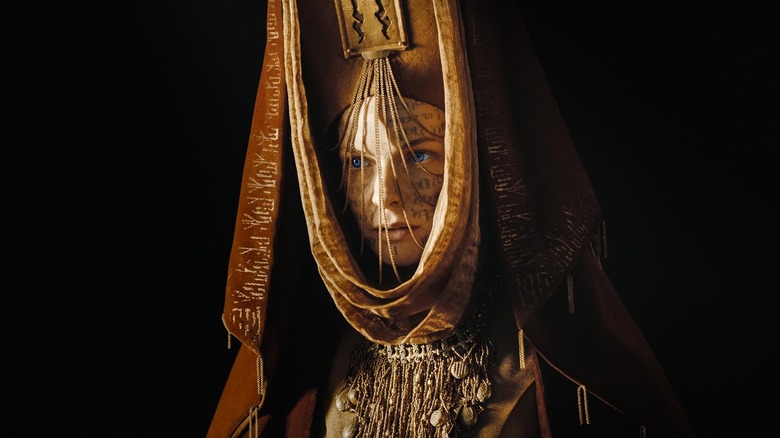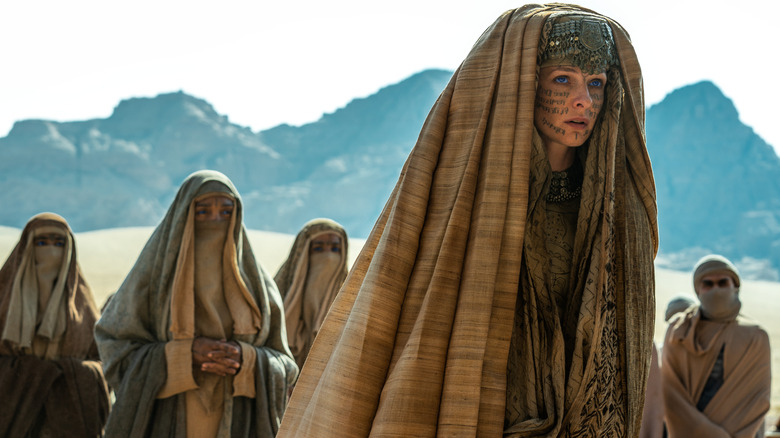Dune: Part Two Is Not As Weird As The Book, But It Keeps One Essential Element
This article contains spoilers for "Dune: Part Two."
Frank Herbert's "Dune" is a masterpiece of science-fiction, a book with almost unparalleled worldbuilding, complex explorations of politics, ecology, religion, and more — while at the same time being just a really good and effective epic tale.
However, Herbert was also a very weird dude whose books go to some bizarre places. Sure, there is still political intrigue and intricate themes and worldbuilding, but there are also people who become worm hybrids and dogs bio-engineered to be shaped like chairs — truly. It is this strange mix of tones that makes Herbert's "Dune" books so difficult to adapt without being either utterly ridiculous or losing that spark that makes the original novels unique.
That's where Denis Villeneuve's adaptation comes in. Both films, but particularly "Dune: Part Two," are a brilliant and bleak blockbuster spectacle that focuses on the story of Paul Atreides (Timothée Chalamet) as a cautionary tale of believing in messianic figures. It still has giant sandworms and tons of action, yet it captures the darkness and complex themes of the original book.
This also means that some of the less serious aspects of the book get sadly left behind, like the spice orgy or the mutant Spacing Guild navigators. But "Dune: Part Two" still keeps the weird when it counts, adapting one of the most bizarre elements of Herbert's original book in a fresh and fascinating way — Alia Atreides.
The babe with the power
We learned in "Dune: Part One" that Paul Atreide's mother, Lady Jessica (Rebecca Ferguson), is pregnant. In both Herbert's original book and David Lynch's underrated "Dune" movie, Jessica's daughter is pre-born — meaning she gained consciousness and a personality even while in the womb — due to exposure to the Water of Life. Toward the end of the book, Alia is only four years old, yet she essentially acts like an adult, even assassinating Baron Harkonnen with a knife.
"Dune: Part Two" doesn't feature a four-year-old talking like a grown woman, but Alia is still very much a part of the film. You see, she is technically never born during the actual film. Given that Villeneuve condenses the timeline of the story from years to a few months at most, this makes sense. And yet, even though Alia is not physically seen by the characters, her presence is all over the film. Anya Taylor-Joy voices the unborn Alia in voice-over narrations that accompany most of the story.
Most importantly, and much funnier, the camera constantly cuts to Jessica's womb, showing the developing fetus listening and even reacting to what's happening around her, clearly aware of Paul's actions. What's more, Jessica is constantly having conversations with her unborn child while walking around the very confused Fremen. Alia may not be a super-powered child, but she is now a super-powered unborn child who talks to and even seems to command her mother. It is bizarre, and it is deeply amusing.
Villeneuve wanted "Dune: Part Two" to fix things he disliked in the novel by giving Jessica a bigger role, and he succeeded. The thing is, her role most involves being influenced by her baby into creating a cult of personality for Paul, with Alia plotting and conniving even before she's born.
Messianic myths and violent wars
Even if Alia is the weirdest part of "Dune: Part Two," she is not the funniest. That honor goes to Javier Bardem's weird zealot Stilgar. Not only does Javier Bardem get his wish to ride a sandworm in the movie, he becomes Paul's first true apostle.
Stilgar was originally introduced as a stoic, stern Fremen leader skeptic of the Atreides yet friendly to Duncan Idaho. He takes Paul in after he proves himself in combat but remains a bit unconvinced. In "Dune: Part Two," however, Stilgar quickly becomes a full believer in Paul as the Lisan al Gaib, evolving into both his right-hand man and hype man. Everything the Atreides' heir does, Stilgar praises as a sign of Paul's holiness.
This serves to illustrate the film's themes of messianic figures and the danger of seeing signs everywhere, but it also means Stilgar is sort of the comic relief. Everything Paul does causes Stilgar to respond with a "Lisan al Gaib!" chant. Bardem fully leans into the absurdity of the role, i.e. the darkly comedic sight of a fierce warrior going nuts for a foreign twink claiming to be The One. Bardem is constantly in awe of Paul, his mouth wide open for most of the film in genuine disbelief that he is witnessing something miraculous. But by the time the credits roll and Paul's jihad on the universe has begun, that laughter turns to horror.
"Dune: Part Two" is now playing in theaters.


